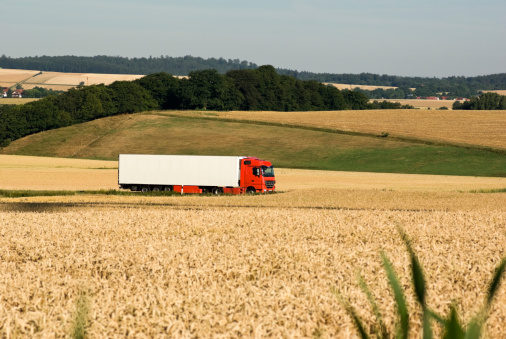According to scientists at the Massachusetts Institute of Technology (MIT), up to 6% of the greenhouse gases being emitted globally could be cut out if corporations improved the logistics of their supply chains for better efficiency. These emissions numbers are calculated based on the path merchandise takes in transit from manufacturer to consumer.
Accumulating “food miles” by ship or railroad leaves a smaller carbon footprint than traveling the same distance by truck, and air freight is worse still. As a society, we’ve long relied on trucks to ship everything to everywhere possible. In the new era of digital commerce, it has become an even higher-volume business to use trucking services to ship products, usually inefficiently, all over the United States.
Supply & Demand Chain Executive magazine has just released its 2010 Green Supply Chain Awards, “recognizing companies that are making sustainability a core part of their supply chain strategies,” according to the publication Web site. Winning companies consisted of logistics firms and various high-volume manufacturers and distributors in all sorts of industries, including Cargill, makers of natural ingredients. This award is an example of growing acknowledgement that the nexus of supply chain management and environmentalism is an important one.
The natural products industry, organic food manufacturers and suppliers in particular, should be closely allied to all efforts at creating sustainable supply chains for business. The ideals of the people behind natural products are well aligned with the concerns of environmentalism, and often these values are found side by side in the same individuals as well as in the actions of the companies they represent.
Case in point is the example of Farm Fresh Direct, is a member of the fledgling initiative called Stewardship Index for Specialty Crops. The aim of this group is to measure fresh produce supply chain performances and to help each other improve sustainability. The coalition of public interest groups, sellers and buyers of these produce products started the project, in the words of Farm Fresh Direct CEO and President Jim Knutzon, “with the intent of developing metrics so that all interested parties could have a degree of confidence in what was really happening with efforts to improve performance on sustainability issues.”
The group is progressing this year with the establishment of metrics to track sustainability in a variety of ways, including at the farm production level, Knutzon says, adding, “It is vital in my opinion to have a consensus on metrics so that the users of the information and those participating in the supply chain have confidence in the process and its outcomes.”
There are resources available to companies looking to lessen their supply chain’s impact. SmartWay is a U.S. Environmental Protection Agency (EPA) initiative that presents broad-based advice and partnership solutions, for everyone from multinational companies down to individuals, geared toward creating more sustainable supply chains in terms of distribution. Through the program, established in 2004, the EPA helps identify products and services that reduce transportation-related emissions. Whether this benefit comes through fuel economy or advanced logistical planning, the end result is “significant, measurable air quality and/or greenhouse gas improvements while maintaining or improving current levels of other emissions and/or pollutants,” according to the EPA. Those interested in the program can find resources and opportunities at www.epa.gov/smartway.
Published in WholeFoods Magazine, January 2011 (online 11/24/10)









